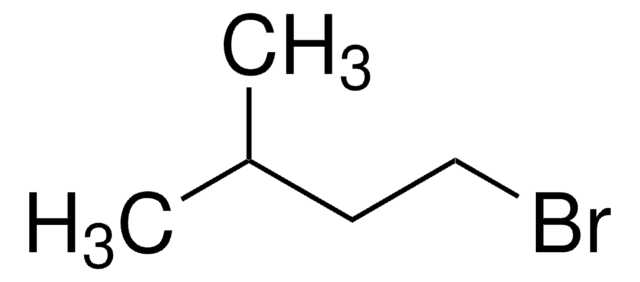249890
1-Bromo-2,2-dimethylpropane
98%
Synonym(s):
Neopentyl bromide
Sign Into View Organizational & Contract Pricing
All Photos(1)
About This Item
Linear Formula:
(CH3)3CCH2Br
CAS Number:
Molecular Weight:
151.04
Beilstein:
1730989
EC Number:
MDL number:
UNSPSC Code:
12352100
PubChem Substance ID:
NACRES:
NA.22
Recommended Products
Quality Level
Assay
98%
form
liquid
refractive index
n20/D 1.436 (lit.)
bp
105-106 °C/767 mmHg (lit.)
density
1.199 g/mL at 25 °C (lit.)
functional group
alkyl halide
bromo
SMILES string
CC(C)(C)CBr
InChI
1S/C5H11Br/c1-5(2,3)4-6/h4H2,1-3H3
InChI key
CQWYAXCOVZKLHY-UHFFFAOYSA-N
Looking for similar products? Visit Product Comparison Guide
Signal Word
Danger
Hazard Statements
Precautionary Statements
Hazard Classifications
Eye Irrit. 2 - Flam. Liq. 2 - Skin Irrit. 2 - STOT SE 3
Target Organs
Respiratory system
Storage Class Code
3 - Flammable liquids
WGK
WGK 3
Flash Point(F)
44.6 °F - closed cup
Flash Point(C)
7 °C - closed cup
Personal Protective Equipment
dust mask type N95 (US), Eyeshields, Gloves
Choose from one of the most recent versions:
Already Own This Product?
Find documentation for the products that you have recently purchased in the Document Library.
Customers Also Viewed
Carmen E Lisowski et al.
The journal of physical chemistry. A, 114(38), 10395-10402 (2010-09-03)
The recombination of chloromethyl and t-butyl radicals at room temperature was used to generate neopentyl chloride molecules with 89 kcal mol(-1) of internal energy. The observed unimolecular reactions, which give 2-methyl-2-butene and 2-methyl-1-butene plus HCl, as products, are explained by
J Ashby et al.
Mutation research, 140(2-3), 71-74 (1984-06-01)
Neopentyl bromide and pentaerythrityl tetrachloride were shown here to be non-mutagenic to 7 strains of Salmonella typhimurium. These inactivities are reflected in the inability of either compound to produce a colour reaction in the chemical alkylation test of Epstein (4-nitrobenzylpyridine
An improved method for cysteine alkylation.
Perrey DA and Uckun FM.
Tetrahedron Letters, 42(10), 1859-1861 (2001)
Direct mono-N-alkylation of amines in ionic liquids: chemoselectivity and reactivity.
Chiappe C and Pieraccini D.
Green Chemistry, 5(2), 193-197 (2003)
Our team of scientists has experience in all areas of research including Life Science, Material Science, Chemical Synthesis, Chromatography, Analytical and many others.
Contact Technical Service














